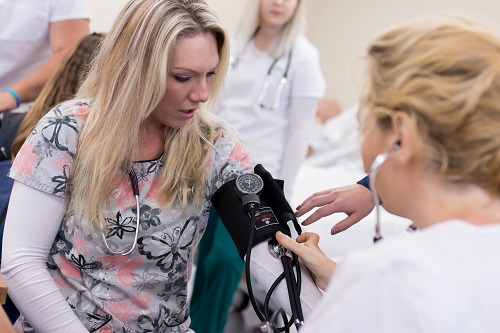The University of Maine at Presque Isle plans to transform an old lecture hall into a state-of-the-art Nursing lab through its new Folsom Hall renovation project, which went out to bid last week. The update to the space on the first floor of UMPI’s major classroom building will allow for a 7-bed healthcare lab with full connectivity and a wide range of simulation capabilities.
The project will support UMPI’s collaboration with the University of Maine at Fort Kent, which has delivered its Bachelor of Science in Nursing degree program on the UMPI campus since Fall 2018. With this expansion, and with both campuses’ continuing efforts to help address the statewide nursing cliff, officials hope to have between 100 and 120 Nursing students working through the UMFK BSN program on the UMPI campus by 2021.
“We’re taking a very static space, currently configured as a stadium seating-style lecture hall and turning it into a space that is flexible, modular, and focused on our commitment to addressing Maine’s workforce challenges, specifically in the healthcare sector,” UMPI President Ray Rice said. “We’re pleased to note that this project will be done utilizing bond funds approved by voters in 2018. These funds, and the project they support, allow our campus to help prepare more job-ready graduates in the career fields where rural Maine most needs workers, like nurses—important now more than ever given the current public health emergency.”
Bids will be opened on May 7. Construction is slated to begin May 18 and be completed by Aug. 28. This renovation project was designed by engineering firm WBRC of Bangor.
The renovation project will involve raising the floor and lowering the ceiling in the space to level it with the rest of the ground floor of Folsom Hall and make it ADA compliant. The space will be outfitted with sustainable fixtures and lighting and include an infrastructure upgrade for air quality.
“Through the voter-approved bond, we’re now able to meet statewide, local, and regional needs while addressing an area in our facility that was no longer matching up with the way we’re teaching and interacting with our students,” Ben Shaw, UMPI’s Chief Business Officer, said. “That space was based on a 1960s design, with teaching in a lecture format as the model. Our classes today are much more hands-on and dynamic, so updating the space in this way is really going to set our Academic programs up for success.”
Once completed, the 1,800-square-foot lab will include two learning areas. There will be a 3-bed simulation room complete with cameras and a control room so faculty can record students completing activities in the space, play back the video for observation and analysis, and provide feedback. In the other half of the room, there will be a highly reconfigurable 4-bed Nursing lab, and classroom area with desks and chairs, for faculty to instruct higher level nursing skills. The space could be turned into anything from a simulated pediatric floor to a Nursing station depending on the day’s lesson.
Each hospital bed in the specialized instruction space will be set up with a bedside table, overbed table, and related equipment, including a needle disposal system, glove dispensing system, oxygen, IV pole, and a privacy curtain. These hospital suites are designed so a human patient simulator mannequin or an actual UMPI student could occupy them for scenarios and simulations.
“When you pull the curtain, a student would not know the difference between working in a hospital and working in this lab,” Barbara Blackstone, UMPI’s Dean of the College of Professional Programs, explained. “This Nursing lab is really going to give our students the chance to develop skills through scenario-based learning and better prepare for the field experiences they’ll complete in local hospitals.”
While the new Nursing lab will serve as a learning space primarily for junior and senior Nursing students, the existing Nursing lab on the first floor of Pullen Hall will be based more around the curriculum for freshmen and sophomore Nursing students.
“Critical thinking is a complex skill for students to attain but a necessary function of successful nursing practice,” Dr. Erin Soucy, UMFK Dean of Undergraduate Nursing, said. “Nurses assimilate a large amount of patient information and then make inferences, prioritize patient care needs, and creatively problem solve. Teaching nursing students through simulation improves critical thinking, psychomotor dexterity, and problem solving skills. We are so happy to have a state of the art simulation lab for our students on the UMPI campus.”
An especially exciting aspect of the Nursing lab is how it can serve as a learning space for other academic programs, such as Social Work, Biology/Pre-Med, Exercise Science, MLT, and the Physical Therapist Assistant program, Blackstone said. For each of these programs, the space will allow faculty to provide students with real-world, scenario-based and simulation learning opportunities as part of their coursework.
“The most important thing is having a space for the faculty to be able to simulate scenarios for their students, making the experiences feel as real as possible,” Blackstone said. “This new space is going to provide a wonderful opportunity for Nursing and other inter-professional healthcare programs.”
For more information about the UMFK BSN program delivered on the UMPI campus, please contact UMPI’s Admissions Office at 207-768-9532 or email umpi-admissions@maine.edu.
